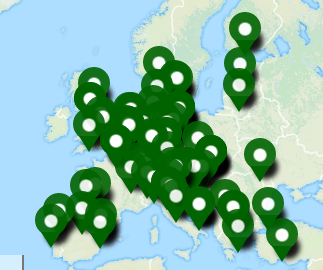We all use models in daily life to explain our environment. An example: I assume that a tree will grow provided it has sufficient water, nutrients and sun. I am using a simple model here, without understanding the nitty-gritty – what exactly happens in the roots, stem, leaves and cells. Thinking in models is not only useful to understand our world, but also to solve problems. Let’s assume the tree is standing infront of my house. I know that when it’s bigger it will cast more and more shade on my house, thus reducing the sunlight reaching the rooms. If I am to prevent this, I can turn to my simple mental model and find out which factors I can and want to change in reality. This is the same procedure scientists use when thinking about reducing greenhouse gas emissions. After compiling a somewhat more complicated model that explains how our economy generates emissions, they too have to ask themselves: Which factors can we change and which do we want to change to reduce emissions? Today’s models feature a great optimism and breadth of ideas when it comes to technical solutions: From the conversion of superfluous electricity to fuel, trucks running on electricity provided by overhead lines, the capturing of CO2 from emission streams or air and storing it underground, to the fertilization of the ocean to stimulate the growth of algae that capture CO2 from the air. This breadth of ideas on the technical side is contrasted by the conviction on the socio-economical side that there are no alternatives. Neither to our form of wealth nor our consumption and production patterns, which are characterized by strictly hierarchical companies determining what to produce and how. The result of this lack of alternatives manifests itself in the assumption that the economy will continue to grow, up to 2050 and above, in the global South as well as the global North. This belief translates into positive growth rates for the economy as a whole and its different sectors, which counteract all mitigation efforts. This begs the question: Where does this blindness on one eye and very sharp eyesight on the other come from? There are probably a number of reasons – e.g. the argument that we need growth to finance climate mitigation, or the inability of most models to incorporate a decrease in economic activity as a planned pathway. I would argue though that the main reason is the lack of imagination necessary to think about the end of growth as something else than an economic crisis, a dystopia. The equation “more growth = more wealth” is deeply ingrained in mainstream economic thinking and if this assumption is not thought as a connection between increased income and material wealth then it is thought as a connection between growth/taxation/social welfare programs and social peace. The possibility that today’s structures (tax system, social welfare, employment market) can be changed, can be made growh-independent, is not widely spread. The same goes for the thought that an economy geared towards growth produces a small number of rich people, but an increasing number of losers, exploited, excluded and burned out people. But maybe this isn’t a problem for the climate? Maybe all the technical options are sufficient and produce good results in all areas? Unfortunately, that is not the case. Germany, despite the Energie(technik)wende, is still by far the country with the highest absolute emissions in the EU and ranks 6th for per capita emissions, well above the EU average. Furthermore, even the self-imposed relative targets such as the reduction of emissions by 40% in 2020 compared to 1990 are getting ever further out of reach. When despite this, traditional mitigation scenarios still show that an ambitious reduction path and economic growth are reconcilable, then maybe there is a discrepancy between what is possible on a (model-)technical level and what is possible in a growth-based society. To put it bluntly: ambitious climate policies fail to be implemented due to lobbying power (e.g. automotive industry vs. CO2-standards, energy industry vs. coal phase-out) that influences politicians who know no alternative to economic growth for solving social problems. A critical reader might now argue that a demand to reduce economic growth or even to degrow our economy will have to face the same opposition. That is correct, and I am not asserting that it will be easy. I do believe though, that a) it is more sustainable to produce less than trying to offset the impact of production with ever more technology, b) it will become easier to consider degrowth once climate mitigation scenarios exist that show its benefits. Finally, and here the circles closes – c) the departure from growth as a political goal is a precondition to implement the ambitious efficiency- and renewables-policies suggested in hitherto climate mitigation scenarios. Thus I appeal to energy and climate scientists to stop limiting the question of effectively saving the climate to the technical sphere. Instead, think about the problem of climate change in combination with other societal problems. Following this path, the first task will not be to strike the right balance between different technologies or to forecast the oil price, but to ask the question: what future do we want to live in? In doing so, we just might realize that it might be more reasonable to trim that tree in the front garden than to install new windows. This blog post summarizes the contents of the German article “Wachstumsrücknahme in Klimaschutzszenarien”.

The negotiators at this year's COP25 in Madrid achieved nothing, despite warnings from many voices about the acceleration of the climate crisis. The UN climate negotiations in Madrid, COP25, have amounted to precious little. The extended talks have provided the opportunity for petrol states and developed countries to excise the red lines of developing countries from the text of the...

International corporations are decimating nature, destroying lives and manipulating opinion. Here's how to stop them.. A US engineering giant sneaks into a Bolivian city under an assumed name and takes over its public water system. A Canadian mining company seeks control of El Salvador’s gold even at the cost of poisoning its drinking water. An Italian energy conglomerate floods ...

In the past year, we have launched a survey worldwide for mapping degrowth realities in the world. 114 organisations answered to the call, with nearly 3,000 active people engaged, mostly located in Europe but also in North and South America, Philippines, Tunisia, Turkey, etc. On August 20th 2018, some members from each of them met for the first time in Freetown Christiania (Copenhagen, Denm...